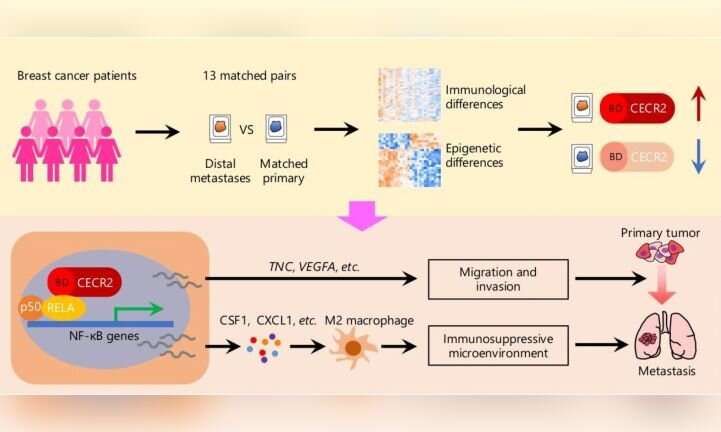New path to treat advanced triple-negative breast cancer

A new study by researchers at Yale Cancer Center shows inhibition of the CECR2 gene prevents triple-negative breast cancer from advancing or metastasizing. The discovery is an early step in finding new therapeutics for triple-negative breast cancer (TNBC), one of the most difficult disease sub-types to treat. The findings are published online today in the journal Science Translational Medicine.
"These study results are very encouraging as there are few effective treatments for triple-negative breast cancer once it has metastasized," said senior study author Qin Yan, Ph.D., Associate Professor of Pathology and Director of Center for Epigenetics and Biomarkers in the Department of Pathology at Yale School of Medicine, co-leader of Genomics, Genetics and Epigenetics Research Program and Scientific Co-Director of Center for Breast Cancer of Yale Cancer Center. "We are constantly searching for new effective therapeutic strategies to help patients with this potentially deadly disease."
In this study, researchers profiled 13 pairs of primary and metastatic breast tumor samples from patients with breast cancer. They identified a therapeutic target, a gene called CECR2, that increased expression in the tumors that have spread to distant organs. The research team discovered that CECR2 allowed the breast cancer cells to migrate and invade to adjacent tissues and evade surveillance by the host immune system. As the result, CECR2 targeting resulted in the activation of T cells and prevented the tumor from spreading. Researchers also discovered that small molecule inhibitors of CECR2 can suppress the ability of TNBC cells to spread in cell cultures and animal models, providing a new avenue of therapeutic strategy to treat advanced disease. According to researchers, the findings could translate to an increased response to current immunotherapies, which had modest efficacy on breast cancer as monotherapies.
"We will continue to study these important findings," added Yan. "We are working on characterizing the mechanisms by which CECR2 modulates gene expression and tumor microenvironment using multiple cutting-edge technologies. In addition, we hope to develop small molecule inhibitors of CECR2 for clinical studies."
More information: Meiling Zhang et al, CECR2 drives breast cancer metastasis by promoting NF-κB signaling and macrophage-mediated immune suppression, Science Translational Medicine (2022). DOI: 10.1126/scitranslmed.abf5473




















